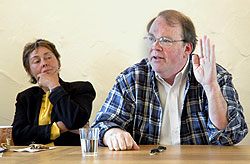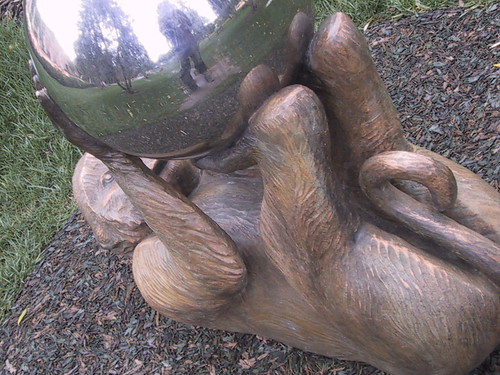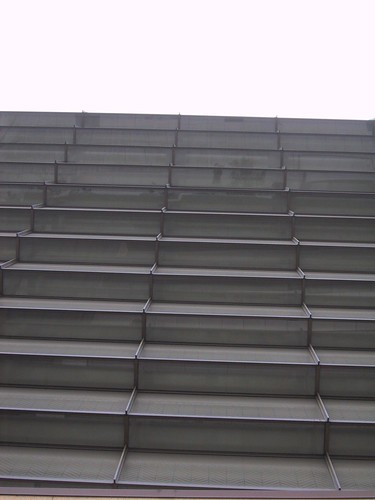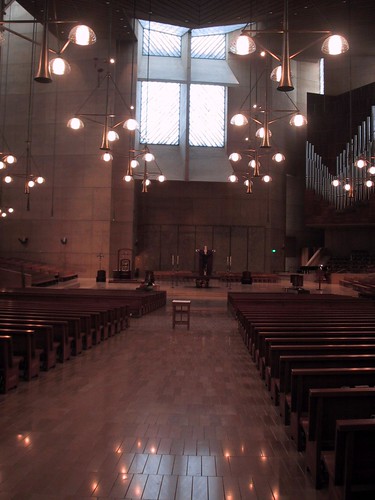The following is from the Paulist run
University Catholic Center at UCLA. It is not uncommon to see the same or similar "liturgical" guidelines followed in parishes throughout the Archdiocese of Los Angeles. The
italicized text are my comments. RS refers to
Redemptionis Sacramentum.
Instructions for Eucharistic Ministers (sic).The correct term is extraordinary minister of Holy Communion. The name "Minister of the Eucharist" belongs exclusively to a validly ordained priest (RS, 154-155). I am prescinding from the very important question of whether in the context of Mass at St. Mark's extraordinary ministers of Holy Communion are even warranted (RS, 157-158)Before Mass:Go to the altar right after you give the Sign of Peace to those around you. As you go, stop by the credence table in the hallway to pick up the extra plates, chalices and purificators. The person with the plates should walk towards the side of the altar closest to the ambo (lectern). The person with the chalices should walk towards the side of the altar closest to the music group.
This same person pours wine (sic) into the chalices, and places the
pitcher on the presider's table. The others divide, two to a plate, to help break the Eucharistic Bread into bite size pieces. Then, take a step back from the altar along with the presider. Join in proclaiming, "Lord, I am not worthy..."
First, it isn't wine, it's the Precious Blood of Christ! Second, Redemptionis Sacramentum expressly forbids the pouring of the Precious Blood. Third, pitchers, flagons, decanters and other such containers are never to be used (RS, 106).
Go to your communion station. If you don't know where to stand, ask the MC before Mass. If you are holding a chalice, please stand as far back from the person with the plate as possible, so that a line may form. As you administer the bread and wine, you may say the person's name if you know it. "N, the Body of Christ." "N, the Blood of Christ."
Give blessings to anyone one comes forward with a hand over their heart or shoulder. Also give a blessing to any small child who is coming forward with or carried by a parent. Place your hand on their shoulder or head, and
pronounce a short inclusive (some of them may not be Catholic or Christian)
blessing. For example, "May the Lord bless you and strengthen you and give you Wisdom." or similar words.
There is no provision in the liturgical books for giving of a blessing, inclusive or otherwise, to a non-communicant during the communion rite. Nor is there any proscription of it, although some have argued, somewhat forcefully, that this practice, which has become commonplace, should be discontinued.
Gather with the presider behind the altar
after all have received. All receive the bread at the same time.
Chew for a while and then offer the cup to one another.
The priest is to communicate before the distribution of communion to the faithful and not after everyone else has received (RS, 97). If there are extraordinary ministers of communion, they are to receive Holy Communion directly from the priest. They are not to distribute communion to one another(RS, 94).Clear the altar. After all have received, the person who placed the
pitcher on the presider's table should retrieve it along with one of the chalices. The others carry the
left-over bread (sic), chalices, purificators, and corporal back to the sacristry as reverently as possible.
Light a small tea candle next to the sacred elements, and HURRY BACK TO THE ASSEMBLY! We wait for you before we continue.
Once the distribution of Communion has been completed, the remaining consecrated hosts should be placed in the tabernacle by the priest or deacon and the Precious Blood should be immediately consumed by the priest or other minister (RS, 107). After Mass:Gather in the sacristy, and
consume any remaining consecrated bread and wine. If there is a lot, Please recruit other members of the community to assist you. Rinse the vessels with a little water and then consume it. Wash and then rinse the vessels, dry them, and return them to their proper places.
No, not in the sacristy after Mass (RS, 107).
Isn't it wonderful that there are
no liturgical abuses in L.A.

















































